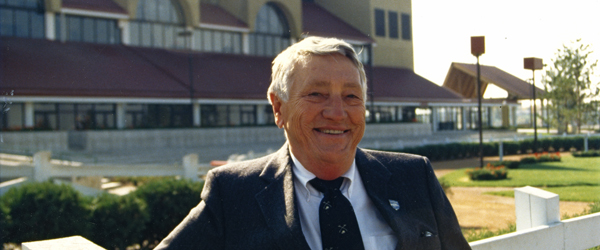 Frances Genter named a horse after him. A program in the stable area once bore his name. The racetrack he built named a race after him. He is, of course, enshrined in its Hall of Fame.
Frances Genter named a horse after him. A program in the stable area once bore his name. The racetrack he built named a race after him. He is, of course, enshrined in its Hall of Fame.
He was honored from the early days of racing by the NAACP for his commitment to affirmative action in a manner not seen before at a U.S. racetrack. The list continues ad infinitum.
Brooks Fields was genuinely touched whenever someone mentioned his association with the state’s racing industry. He was humbled even though it was he who brought horse racing to Minnesota in 1985, despite knowing little or nothing about thoroughbreds or quarter horses.
Tomorrow, Canterbury Park will salute him with its annual running of the $50,000 Brooks Fields Stakes. It couldn’t come on a more appropriate day for his daughter, Sara Nessan, who will present the trophy to the winner.
“Father’s Day. It’s all so perfect,” she said.
She believes her father would have been pleased with the recent agreement between Canterbury Park and Mystic Lake. “He would have been very happy for the people of Minnesota,” she added. He would have been pleased for the industry and everyone who makes a living in it.
Fields’s vision and belief in the undertaking that would become Canterbury Downs came after a successful career in the grain business and in real estate, and he undertook the challenge at an age when many men would have collected the royalties of a job well done and headed to the golf course or lake cabin.
Fields was 66 years of age when he took on the construction of a racetrack on farmland surrounded by acres of the yet undeveloped Shakopee landscape. “My mom thought he was nuts,” said Nessan.
Yet Fields proceeded full bore with the project his wife, Martha, originally associated with his dotage, and on June 26, 1985 a gathering of 15,079 newcomers welcomed pari-mutuel racing to Minnesota, nervously putting nearly $868,000 through the windows.
Canterbury Downs was officially part of the Minnesota sports landscape.
“He loved it. He was so proud of it,” Sarah said. “It was always so near and dear to his heart.”
What the early employees at Canterbury learned was that Fields did not recognize a class system in the building. “He treated everyone alike,” Sarah recalled, “the valets, the jockeys, the people at the concession stands. He talked about everybody the same.”
That meant everybody.
While implementing affirmative action policies at Canterbury Downs, Fields developed a close friendship with Jesse Overton, now the chairman of the Minnesota Racing Commission. “He was my inspiration,” said Overton. “He wrote a letter to (Gov. Tim) Pawlenty recommending me for the commission.”
Fields eschewed rigid formalities whenever he met people. He was open and friendly with them, down to earth. His friends called him Brooker.
He had little knowledge of pari-mutuel racing when he undertook the project of building Canterbury Downs along with partners that included Santa Anita Race Track in California. His knowledge of horses was limited as well, although he was part of the last unit to go through horse cavalry school at Fort Riley, Kan.
Oh, and there were those trips to the Sonoran desert. “Growing up he was always taking us horseback riding in Arizona,” Sarah recalled.
There was one another association with horses as well. “My father and mother went to London many years ago and bought some carousel horses,” Sarah added. “They came back with three ponies, two pokers and one big horse. The big one was at their place in Arizona. Every single grandchild was on that horse at one time or another.”
Fields was a people person and it is that legacy by which he is best recalled.
“People were his passion,” Sarah added. “He loved people.”
They loved him back.
“He was truly humbled whenever anyone mentioned the track or thanked him for what he had done,” she said.
Martha Fields died in 2001 and Fields later remarried, to Lucy, a longtime friend of his and Martha’s.
“He was so nonjudgmental with people,” Lucy said. “He let people be themselves.”
Fields, of course, was known for his mind as well as his heart. “He was brilliant,” Lucy said.
Smart enough to handle the rigors of Yale University and to learn the Chinese language well enough that he was used as an interpreter in China by the U.S. Army.
Fields died in June of 2008 at 89, a couple of weeks after attending the Brooks Fields Stakes. In his final days, it was he who expressed gratitude. “He felt blessed,” Lucy said. “He said that he had had a wonderful life, had made more money than he could dream about, had two wonderful wives and wonderful children.”
He had friends wherever life took him. Many of them will be at Canterbury Park today to watch the race named in his honor.
Oh, and the horse Frances Genter named for him?
Brooker – of course.
This blog was written by Canterbury Staff Writer Jim Wells. Wells was a longtime sportswriter at the Pioneer Press and is a member of the Canterbury Park Hall of Fame.